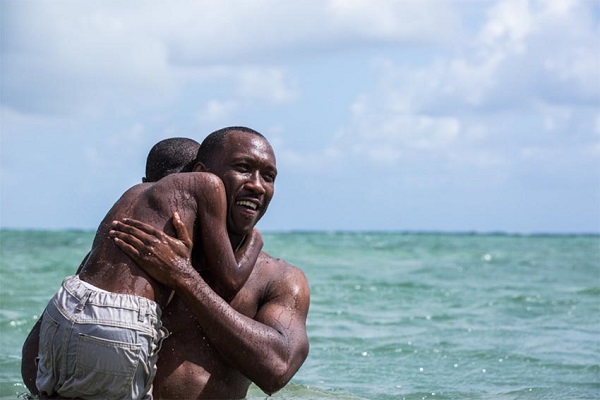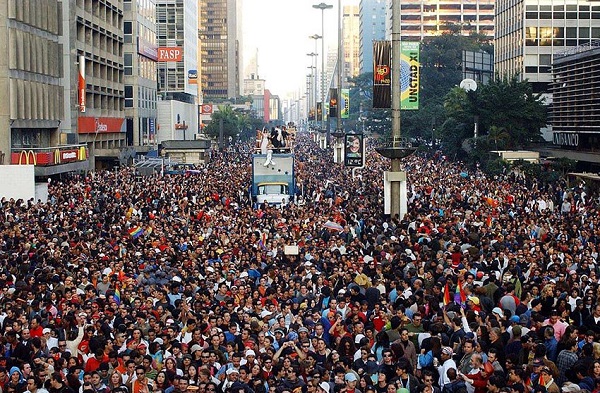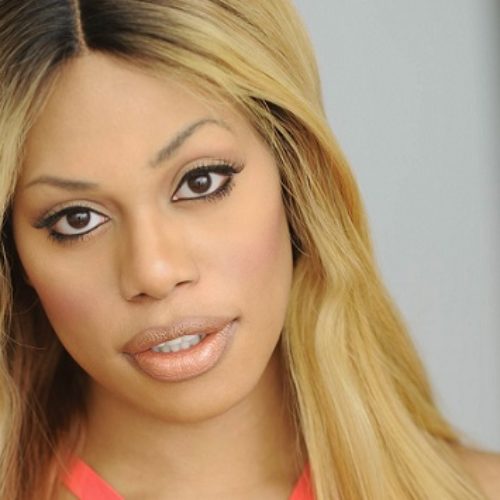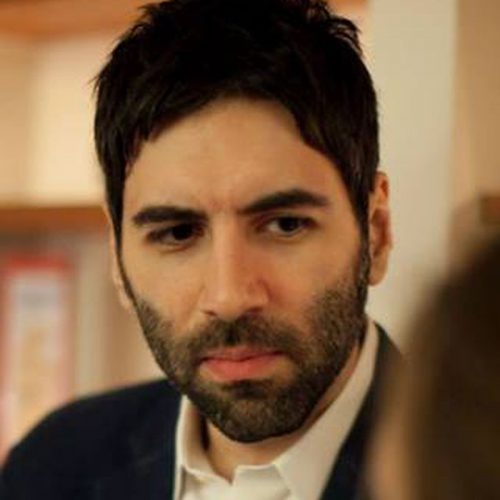The most illuminating LGBTI stats and facts from around the world
This couple spent a year collecting fascinating LGBTI data to answer every question you can dream of.
*
My husband and I spent a year collecting LGBTI data from hundreds of surveys, polls, reports, studies and monographs. And the result is our new book, LGBTQ Stats: Lesbian, Gay, Bisexual, Transgender, and Queer People by the Numbers.
Ever wonder how many people around the globe live in countries where same-sex activity remains subject to criminal prosecution? Or how many trans people have been elected to public office? What relationship style lesbians prefer? Which US state was the first to elect an openly bisexual governor? Or what the top-grossing films are with LGBTQ content?
We answer these and about 1,000 other questions.
Noted economist and professor MV Lee Badgett, of The Williams Institute, says the book is ‘the most comprehensive portrait of LGBTQ life around.’
There are plenty of surprising facts and eye-opening figures.
My husband David Deschamps explains: ‘I was especially struck by the change in attitudes among young people. There has been a huge generational shift in a remarkably short span of time – from revulsion and derision to acceptance and marked casualness.’
Here is some of the most interesting LGBTI data, stats and facts we found:
Shifting Attitudes
In 1994, 51% of college freshmen in the US believed lesbians and gay men should try to be heterosexual. Today, an astonishing 31% of 18- to 29-year-olds in the US and a whopping 49% of 18- to 24-year-olds in the UK describe themselves as ‘not 100% heterosexual’.
In 1985, 24% of Americans said they personally knew a lesbian or gay person. By 2015, that number had risen to 88%.
LGBTIs And The Law
There is no country on earth in which LGBTI citizens enjoy the same legal rights that their heterosexual counterparts take for granted. More than 2.7 billion people live in countries where being LGBTI is punishable by imprisonment, violence, or death.
The UN Security Council’s first meeting dedicated to addressing the persecution of LGBTI people took place In August 2015.
73 countries and 5 entities imprison consenting adults for homosexual acts. In 45 of these nations, the law is applied to women as well as men. In 14 countries, including Uganda and India, the potential penalty for engaging in same-sex activity is life in prison.
France became the first European country to decriminalize same-sex activity between consenting adults of the same gender in 1791. The following countries repealed sodomy laws in the years indicated:
Brazil in 1830.
Mexico in 1871.
Russia in 1917 (recriminalized in 1933 and decriminalized in 1993).
Poland in 1932.
Switzerland in 1942.
England in 1967 (partial decriminalization); gay men achieved full decriminalization in 2003.
Spain in 1979.
All of Australia in 1997.
All of the US in 2003.
Homosexuality remains a crime in 37 of the 52 nations that make up the Commonwealth of Nations (formerly the British Commonwealth).
North Korea, South Korea, Taiwan and Vietnam have never had Western-style sodomy laws.
Japan holds the distinction of having one of the shortest-lived sodomy laws in the world. The statute was in place from 1873 to 1883. Samurai warriors, who had a long tradition of same-sex relations, mounted strong opposition to the law and helped to get it repealed.
South Africa’s post-apartheid constitution of 1996 was the first in the world to prohibit discrimination on the basis of sexual orientation.
Shocking HIV Stats
Globally, trans women are 49 times more likely to have HIV than other adults of reproductive age.
As a result of homophobic laws, lack of sex education, and the absence of needle-exchange programs, the size of Russia’s HIV-infected population nearly doubled between 2010 (when it stood at 500,000) and 2015 (when it reached 930,000).
The AIDS Memorial Quilt was first unveiled at the Second National March in Washington for Lesbian and Gay Rights on 11 October 1987. It is composed of more than 48,000 panels. Each panel is a tribute to someone who has died of an AIDS-related illness. It is the largest piece of folk art in the world. The quilt covers 1.3 million square feet (or about 50 miles or 80 kilometers) and weighs more than 54 tons. More than 14 million people have seen it at thousands of displays worldwide. It was nominated for the Nobel Peace Prize in 1989.
LGBTI Politicians And Head of Governments
Jóhanna Sigurðardóttir became Iceland’s first female prime minister — and the world’s first openly lesbian head of government — on February 1, 2009. She served until 2013. There have been three other openly LGBT heads of state:
Elio Di Rupo, prime minister of Belgium from 2011 to 2014.
Xavier Bettel, prime minister of Luxembourg from 2013 to the present.
Leo Varadkar, who at 38 made history in 2017 by becoming Ireland’s youngest and first openly gay prime minister.
On February 18, 2015, Kate Brown became the first openly bisexual governor in American history. Brown was sworn in as Oregon’s governor following the resignation of her predecessor. She became the first openly bisexual person to be elected governor in the US after her victory in a 2016 special election.
According to a Washington Post analysis published in December 2015:
Since 1977, 139 transgender candidates have run for more than 200 races in 31 countries.
52 transgender candidates were elected.
Nearly 90 percent of these candidates were trans women.
As of December 2015, 20 transgender elected officials were in office.
The ‘Gay Happiness Index’ Winners Are…
In a 2015 study of 115,000 of its members, Planet Romeo – an international social network for GBT men – created a ‘gay happiness index’. It had three criteria:
How do gay men feel about society’s view of homosexuality?
How do gay men experience the way other people treat them?
Are gay men satisfied with their lives, and do they accept themselves?
Based on these criteria, of the 127 countries rated, the top nations in the gay happiness index were:
1 Iceland
2 Norway
3 Denmark
4 Sweden
5 Uruguay
6 Canada
7 Israel
8 Netherlands
(The UK ranked 23rd and the US ranked 26th.)
The lowest-ranked nations (in descending order) were:
8 Cameroon
7 Iran
6 Nigeria
5 Iraq
4 Kyrgyzstan
3 Ethiopia
2 Sudan
1 Uganda
What Kind Of Relationship Do Lesbian And Bi Women Want?
Lesbian website Autostraddle asked 8,566 self-selected lesbian, bisexual, and trans women about their preferred relationship style in a 2015 survey:
61.7% of respondents chose monogamy.
22% chose ‘mostly monogamy’ – which, in the words of the survey authors, ‘means many different things to many different people’.
6% chose an open relationship.
5.3% chose polyamory.
1.4% chose ‘don’t ask, don’t tell’. That means partners are free to do whatever they want with whomever they want as long as it doesn’t become known to the other partner.
0.58% chose polyfidelity, which is when you are in a relationship with more than one other person and you are all emotionally and sexually faithful to each other.
0.39% chose triad — a closed relationship that involves three people, also called a ‘thruple’.
What LGBTI Films Are Box Office Hits?
Two LGBTI-themed films share the title of winning the most Oscars. This year Moonlight won Academy Awards for Best Picture, Best Supporting Actor, and Best Adapted Screenplay. And in 2006, Brokeback Mountain won Academy Awards for Best Director, Best Adapted Screenplay, and Best Score. The Academy also nominated Brokeback Mountain for Best Picture but it missed out.
At $83,043,761 in US earnings, Brokeback ranks as the fourth-highest-grossing LGBTI film. The Birdcage is first ($124,060,553), Interview with a Vampire comes second ($105,264,608), and The Imitation Game is third ($91,125,683). To date, Moonlight has grossed $27,854,932.
Which City In The World Has The Biggest Pride?
According to estimates from organizers, police, and media accounts, the largest LGBTI Pride events, calculated by the number of attendees, include:
1 São Paulo Pride Parade (2006) – 3 million people
2 Madrid Europride Festival (2007) – 2.3 million
3 New York City Pride Parade (2016) – 2 million
4 San Francisco Pride Parade (2014) – 1.7 million
5 New York City Pride Parade (2015) – 1.6 million
6 Cologne Europride Parade (2002) – 1.4 million
7 Toronto Pride Festival (2012) – 1.2 million
8 Madrid National Pride (2012) – 1.2 million
And Some ‘Firsts’ From LGBTI History
Dr. Magnus Hirschfeld founded the first ‘homosexual emancipation organization’ on 15 May 1897. It was called the Scientific-Humanitarian Committee and was in Berlin.
The first formally organized LGBTI movement group in the United States was the Society for Human Rights in Illinois in 1924. A few months after its founding, the group ceased to exist in the wake of several members’ arrests.
According to historian Susan Stryker, ‘the first known incident of collective militant queer resistance to police harassment in US history’ took place in August 1966. Transgender people staged a rebellion outside Compton’s Cafeteria in San Francisco’s Tenderloin district to protest mistreatment and abuse by the police.
A World Of LGBTI Data
LGBTQ Stats: Lesbian, Gay, Bisexual, Transgender, and Queer People by the Numbers is published by The New Press. Husband-and-husband team of David Deschamps and Bennett Singer are the authors.
To learn more or to contact the authors, visit the LGBTQ Stats site.













7 Comments
Kenny
August 03, 10:26Wow! They tried
Pink Panther
August 03, 10:30I know, right? Such research. Very illuminating.
Delle
August 03, 10:33I want that book.
So insightful!
Pink Panther
August 03, 10:36Their website is on the site. 🙂
Mitch
August 03, 12:28Wow!
They really did a lot of work
Duke
August 03, 20:09All i want to be is to be in those top gay friendly countries.
OJ
August 05, 09:05This is beautiful!